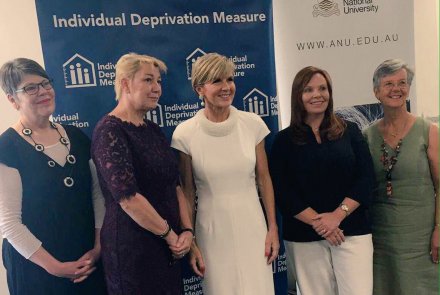
Photo courtey of IDM: IDM team and the Minister for Foreign Affairs Julie Bishop
Getting the measure of disadvantage
A new $9.5 million grant to Crawford School and the International Women’s Development Agency will develop the Individual Deprivation Measure (IDM) - a new, gender-sensitive and multidimensional measure of poverty, the Minister for Foreign Affairs Julie Bishop announced today.
The funding for the project will come from the Department of Foreign Affairs and Trade over four years. Minister Bishop launched the program at the Development Policy Centre’s 2017 Australian Aid Conference.
“It’s important our support has an impact and so I … announce today that the Australian government is supporting a $9.5 million partnership with ANU and the International Women’s Development Agency to research and implement a program that analyses the extent of the disadvantage faced by individuals particularly women and girls in these scenarios,” Minister Bishop said.
“The result will be the Individual Deprivation Measure, a data tool for policymakers to better target our aid and improve its effectiveness. So congratulations to ANU and International Women’s Development Agency.”
Crawford Associate Professor Sharon Bessell is one of the key researchers working on the IDM program. The program commenced in 2016 with a goal to be available for global use by 2020 as a key tool for tracking how development is changing the lives of the most deprived, and builds on earlier work undertaken through an Australian Research Council Linkage Grant.
Associate Professor Bessell said it was impossible to effectively tackle problems unless they could be understood. For too long, lack of investment in individual data collection has limited the understanding of who experiences poverty and how.
“We need better and different types of data, especially gender data,” Associate Professor Bessell said.
“The IDM is the first gender-sensitive poverty measure. It is based on the priorities and experiences of both women and men who have lived in poverty, and responds to what matters to them. The IDM is able to help reveal the nature and extent of poverty experienced by women and men - and this matters for developing the policies and services that are necessary to fulfill the global promise to leave no-one behind.”
Associate Professor Bessell said that Crawford was delighted to be working in partnership with IWDA and DFAT to improve the ways in which poverty is measured, and that she is excited to be at the cutting edge of global efforts to improve the gender sensitivity and policy relevance of data.
“This funding provides a real opportunity for us to use high quality research to build policy-relevant knowledge and support policy making, both within countries and globally, which is very much at the heart of the work we do in Crawford School.”
Associate Professor Bessell is working alongside Associate Professor Janet Hunt from the ANU Centre for Aboriginal Economic Policy Research (CAEPR) and in partnership with the IWDA to develop this important new measure of poverty.
Updated: 27 July 2024/Responsible Officer: Crawford Engagement/Page Contact: CAP Web Team













